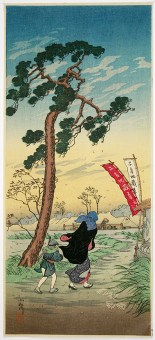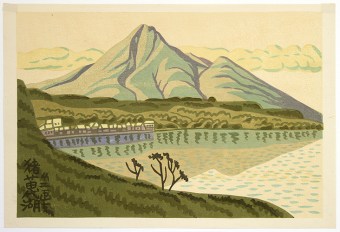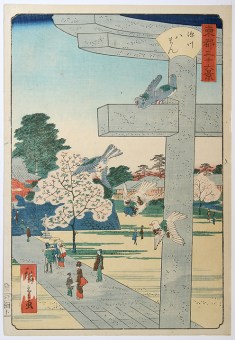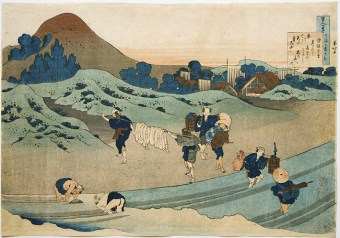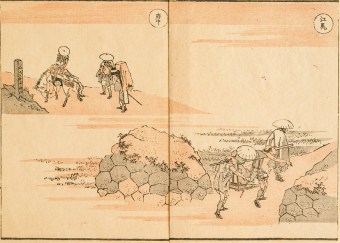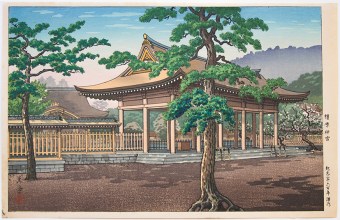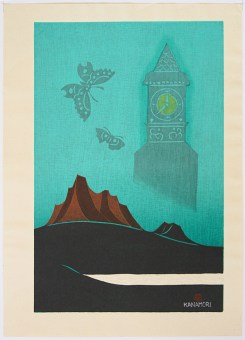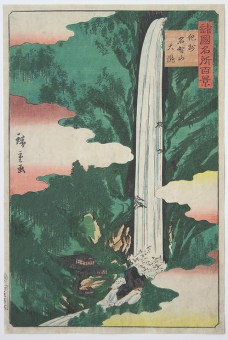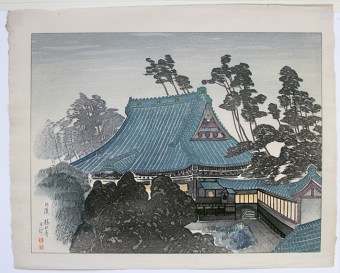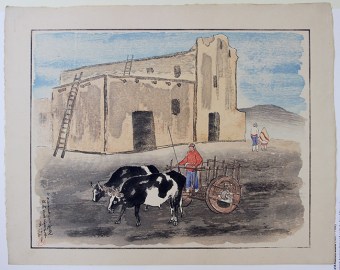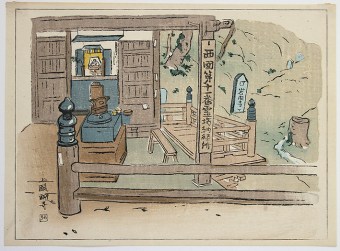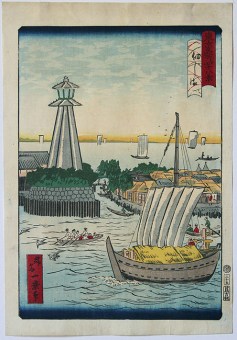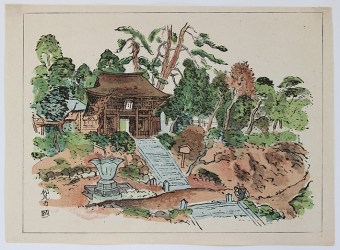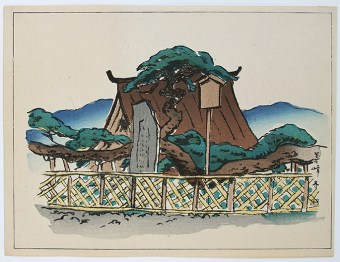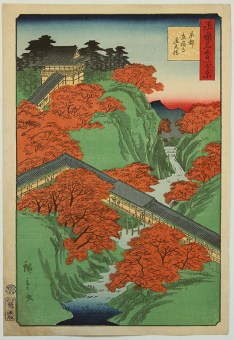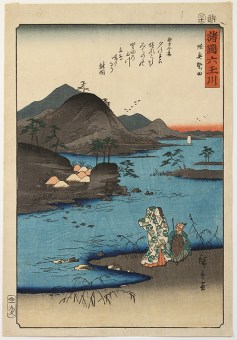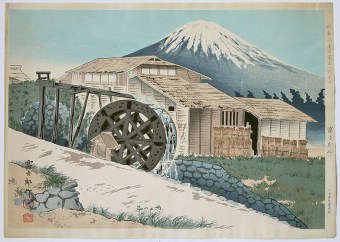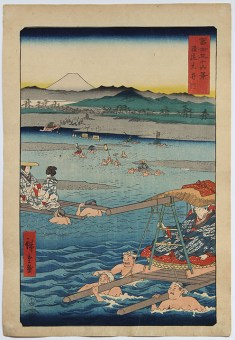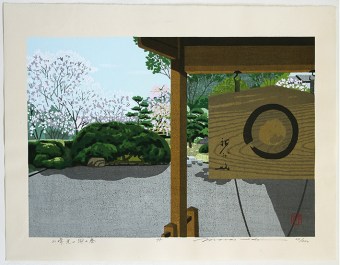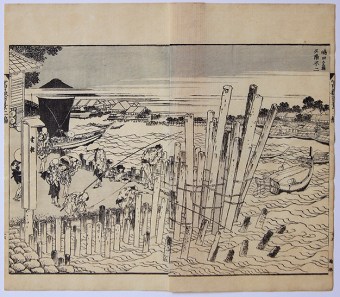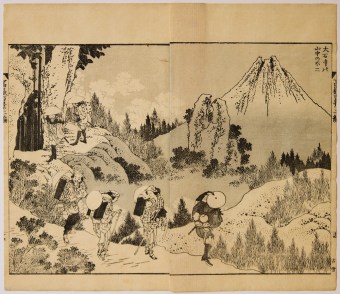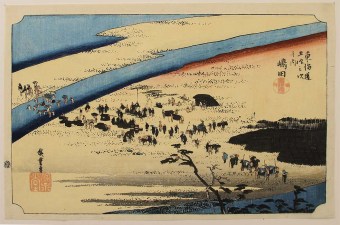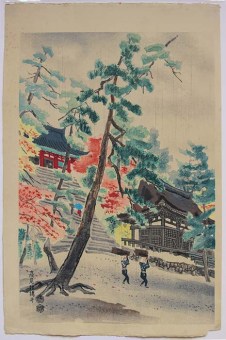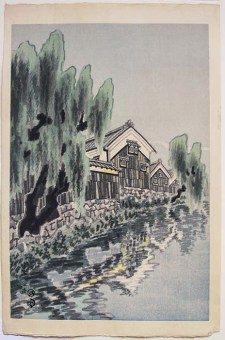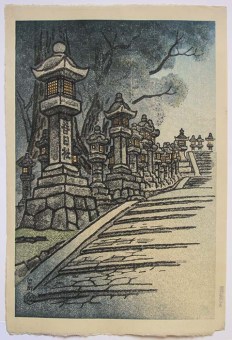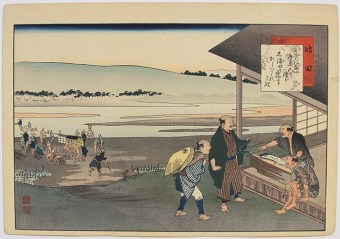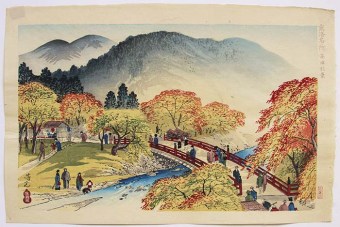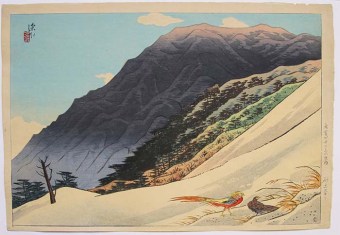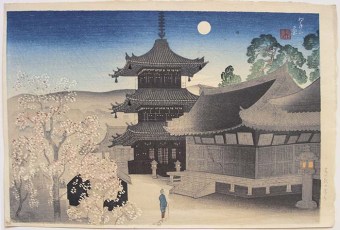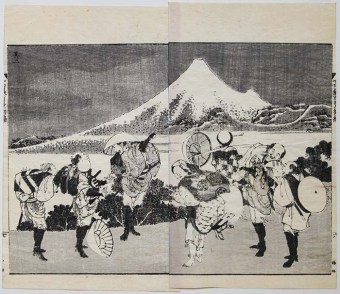Landscapes
From grand temples in Kyoto to the snow-tipped peak of Mount Fuji - atmospheric landscape views (fūkei-ga) belong to the most popular and most collected genre of Japanese woodblock prints outside of Japan. These woodblock prints offer a view into everyday life of the Japanese and, in particular, their growing enthusiasm for the country's many scenic destinations.
Hokusai and Hiroshige, the most well-known landscape print artists
Many woodblock print artists produced landscape prints. The two most renowned masters of landscape prints during the Edo period were Katsushika Hokusai and Utagawa Hiroshige. Hokusai and Hiroshige defined the genre with their highly popular print series 'Thirty-six Views of Mt. Fuji' (Fugaku Sanjūrokkei), 'One Hundred Famous Views of Edo' (Meisho Edo hyakkei), and 'Fifty-three Stations on the Tōkaidō' (Toukaidō Gojūsan-tsugi).
Hokusai’s 'Thirty-six Views of Mt. Fuji' shows a variety of scenes, with the ever-present Mount Fuji dominating the background. It includes the perhaps most iconic of all ukiyo-e prints: Great Wave off the Coast of Kanagawa (Kanagawa-oki Nami Ura).
In contrast to Hokusai’s grand compositions, Hiroshige’s intimate and atmospheric views of the Tōkaidō, one of the most important post and trade routes (kaido) of Edo Japan, became the best sold series of Japanese woodblock prints ever. Another artist worth noting is Utagawa Kuniyoshi, who became known for his townscapes prints apart from warrior prints and caricatures.
The desire for travel in the nineteenth-century
After centuries of civil war and harsh travel restrictions, the lasting peace of the Edo period (1600–1868) has generated a real travel boom.
To ensure loyalty, the shogunate required that all feudal lords pay regular visits to Edo (now Tokyo). This forced presence led to a rapid improvement in the country’s infrastructure. With the development of a safe highway system (Gokaidō), pilgrimages, and journeys within Japan increased. The newfound wanderlust created a desire for prints of famous and beautiful landscapes, which were bought as affordable souvenirs, or to get a glimpse at prominent places they will or never be able to travel to, similar to travel magazines.
Popularity of Ukiyo-e landscape prints in Europe/ the West
As the Japanese market for woodblock prints declined in the late nineteenth-century, interest in the medium soared in Europe and the United States. Japanese woodblock prints were first introduced at the 1867 International Exposition in Paris to western audiences. The event initiated a craze for Japanese art and design, along with its influence in western Europe called Japonisme. Impressionist artists in Paris, such as Claude Monet and Vincent van Gogh, eagerly collected landscape prints, which exerted a considerable influence on their subsequent arts and crafts. Paintings like Monet's 'La Japonaise' and James Whistler's 'The Princess from the Land of Porcelain' impressively illustrated the western fascination of the East.
Landscapes in modern Japanese art
As foreign interest grew, landscape prints experienced a revival within their own country in the twentieth-century through artists such as Kawase Hasui and Hiroshi Yoshida. Shin hanga (new prints) and another movement called sosaku hanga(creative prints) helped revitalized the popularity of old-fashioned woodblock prints. Naturalistic light, shade, textures and perspective have been added to show the tranquillity of human-nature coexistence. Seasons (for example early spring, midsummer and cherry blossom), the time of day (full moon, morning mist) and weather conditions (temple in snow or after rain) also set the prints to a specific time of day and year.
Windy day at Komatsugawa
(E043)
Inawashiro-ko
(1799)
Fukagawa Hachiman Shrine
(E227)
Poem by Jitô Tennô
(E154)
Pictures of the Tokaido Road
(E251)
Kashiwara Shrine in Nara
(F061)
Memories
(E067)
Kishû Nachisan ôdaki (The Great Waterfall at Mount Nachi in Kii)
(G206)
Nichiren Ryûkô-ji
(1819)
Gurando kyanion shoken (Ox Cart in Grand Canyon)
(1818)
Kami-Daigo-ji (Kami-Daigo-ji Temple in the South of Kyoto)
(1778)
Tsukudajima Island
(E013)
Matsunô-dera (Matsunô-Temple)
(2030)
Yoshimine-dera (Yoshimine-Temple in Kyoto)
(1777)
Kyōto Tōfuku-ji Tsūten-(kyō)-bashi
(G606)
Mutsu Noda (The Noda Jewel River in Mutsu Province)
(H1041*)
Suisha goya no Fuji, Ômiyaguchi
(1383)
Sun-En Ôigawa (The Ôi River between Suruga and Tôtômi Provinces)
(I071)
Spring in Yamazaki
(I205)
Shimadagahana sekiyō Fuji
(I373)
Taisekiji no sanchū no Fuji
(I357)
Shimada: Shimada, Ôigawa Sungan
(I172)
Takao Jingo-ji (Jingo-ji temple in Takao)
(2196)
Ujigawa haryū (Tributary stream of Ujigawa)
(2197)
Kasuga Taisha (Kasuga shrine in Nara)
(2201)
Shimada (24th station)
(2168)
Takao shūkei (Takao in autumn)
(2173)
Sajō sukii (Skiing on sand)
(2165)
Haru no your no Kiyomizu (Spring evening at Kiyomizu temple)
(2166)
Part of the Same (Sono ni)
(I679)



